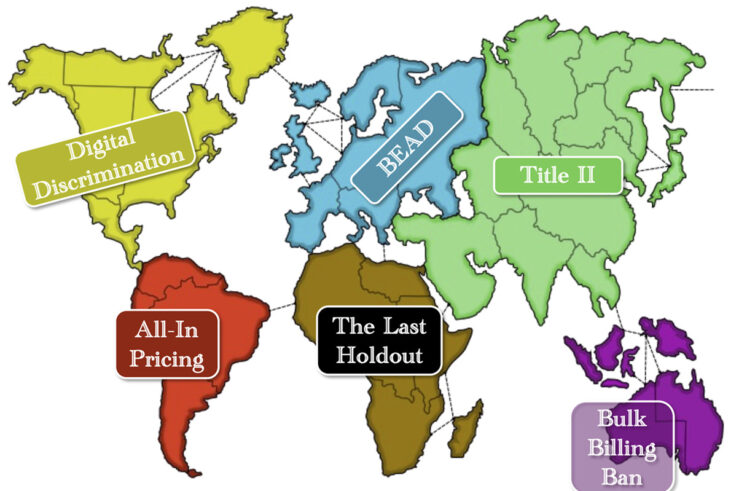I recently heard an ominous NPR story on the rise in trips to the emergency room by people seeking dental treatment. In 2009 alone, Tennessee’s emergency rooms had more than 55,000 dental-related visits — five times as many as for burns. Florida’s emergency rooms experienced over 115,000 ER visits for dental matters in 2010. Charges for those visits totaled $88 million.
This is a big problem. Emergency rooms aren’t set up to treat dental patients, and the charges they impose dwarf those dentists charge for emergency work, much less for the sort of routine dental service that prevents dental emergencies in the first place. A huge amount of money could be saved if people — especially the poor folks who tend to use the emergency room for dental work — would just go to the dentist.
One approach to the problem would be to try to reduce the cost of preventive dental care. The vast majority of routine dental care can be (and, it seems from my own experience, usually is) provided by technicians who have some relatively low-cost specialized training but are not licensed dentists who have earned an expensive degree from a dental school. If regulators gave these folks more leeway to provide routine services without having to send their bills through a dentist who is sure to mark them up, the price of routine preventive services would fall, and more low-income folks would purchase them. The dental lobby, however, fights tooth and nail against this sort of reform.
A more likely policy response may come under the Affordable Care Act (aka Obamacare). As we’ve recently seen in the brouhaha over the Obama Administration’s contraception mandate, the Affordable Care Act requires that insurers fully cover, without any copayment requirement, any preventive measures that the United States Preventive Services Task Force (USPSTF) has rated “A” or “B” in terms cost-effectiveness. Birth control and the so-called “morning after” pill were so rated, which is why the Obama Adminstration is requiring that employer-provided insurance policies cover them.
Isn’t basic dental service (routine cleanings, check-ups, etc.) a cost-effective preventive measure? It certainly prevents serious and costly disease. According to the USPTF’s grade definitions, a preventive measure will receive an A or B rating if there is at least a “moderate certainty that the net benefit is moderate to substantial.” The NPR report and the Pew Study on which it’s based suggest that routine dental services would surely earn an A or B rating. If they’re so designated by USPTF, then it would seem that employer-provided insurance policies would have to cover them. [Note that I use the awkward “it would seem” phrase because I haven’t scoured the gazillion-page statute to see if there’s some sort of exemption that would except dental services; there may well be.]
“So what?”, you ask. Why would it be a bad thing if health insurance routinely covered dental procedures that would prevent serious ailments down the road? More people would then take the cost-effective precautions, thereby reducing the overall cost of health care.
Perhaps. But greatly expanding insurance coverage of dental services would likely have an unintended (except from the dentists’ perspective!) consequence: It would drive up the price of dentistry. In the current environment in which most people lack dental insurance or have relatively stingy policies, consumers are intensely interested in the price of dental services. Dentists respond by competing on price or, what is the same thing, the provision of “free” services like teeth whitening for new customers. Cheapos like me just go to a different dentist for every routine cleaning in order to get a new customer discount each time.
If employer-provided health insurance begins to cover the full price of routine dental services — an outcome that would seem to be required by the Affordable Care Act — then we can expect these promotions to end. Why would dentists compete on price when the customers selecting the dentists have no skin in the game? Insurers might inject some price competition by setting maximum prices for “in network” dentists, but price competition at this level is far less vigorous than when the consumer is directly paying her own money out of pocket. (Compare, e.g., price competition over LASIK treatments, purchased out of pocket, to price competition for routine doctor visits, which insurance covers in large part.)
As economist after economist after economist explained in the debate over the Affordable Care Act, a primary reason for spiraling health care costs is the prevalence of generous third-party insurance that covers almost everything and thereby decimates patients’ incentive to shop on — and thus providers’ incentive to compete on — price. Expanding this pernicious dynamic into the realm of dental services would be disastrous for all except dentists.
A far better way to address the problem of underutilization of preventive dental services would be to lower the cost of those services by liberalizing dentistry regulation (i.e., allowing trained non-dentists, who are cheaper, to do more). The dental lobby will oppose such a move, and the Affordable Care Act, I fear, provides it with an alternative policy to endorse and pursue. Yet another example of how the Affordable Care Act’s effort to increase insurance coverage undermines efforts to reduce costs.




